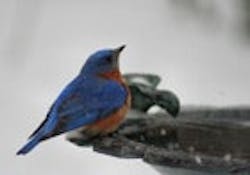New Jersey American Water Provides Homes for Birds
Native birds are now welcome to flock to New Jersey American Water properties. Through its Environmental Stewardship Program, the company installed nesting boxes on its properties in Atlantic County, its Canoe Brook Water Treatment Plant in Short Hills and at the Glendola Reservoir in Monmouth County.
In Atlantic and Cape May Counties, bluebirds and tree swallows will find nesting boxes on New Jersey American Water’s properties in Egg Harbor Township, Galloway Township and Ocean City.
Four nesting boxes have been installed at the Glendola Reservoir in Wall Township, Monmouth County. These boxes are placed in a protected environment and offer the native birds a nesting habitat.
After consulting with the Audubon Society, New Jersey American Water installed nesting boxes between its two reservoirs in Short Hills for the American wood duck, whose population has been declining due to lack of habitat. Since wood ducks only nest in wetlands or very close to waters, the protected reservoir properties and wetlands at the Canoe Brook plant offer them the ideal habitat.
“New Jersey American Waters seeks to install nesting boxes for those species that suffer from a lack of nesting sites,” said Gary Matthews, environmental manager for the company. “We have facilities that are ideal for enhancing natural habitats and which enable us to be good neighbor to these native species.”
Source: Business Wire
